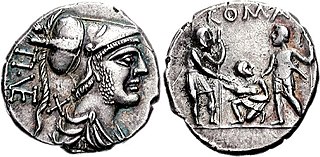The lex Canuleia, or lex de conubio patrum et plebis, was a law of the Roman Republic, passed in the year 445 BC, restoring the right of conubium (marriage) between patricians and plebeians.

The gens Licinia was a celebrated plebeian family at ancient Rome, which appears from the earliest days of the Republic until imperial times, and which eventually obtained the imperial dignity. The first of the gens to obtain the consulship was Gaius Licinius Calvus Stolo, who, as tribune of the plebs from 376 to 367 BC, prevented the election of any of the annual magistrates, until the patricians acquiesced to the passage of the lex Licinia Sextia, or Licinian Rogations. This law, named for Licinius and his colleague, Lucius Sextius, opened the consulship for the first time to the plebeians. Licinius himself was subsequently elected consul in 364 and 361 BC, and from this time, the Licinii became one of the most illustrious gentes in the Republic.
The gens Lutatia, occasionally written Luctatia, was a plebeian family of ancient Rome. The first of the gens to obtain the consulship was Gaius Lutatius Catulus in 242 BC, the final year of the First Punic War. Orosius mentions their burial place, the sepulchrum Lutatiorum, which lay beyond the Tiber.
Gnaeus Manlius Vulso was Roman consul in 474 BC with Lucius Furius Medullinus Fusus.
The gens Menenia was a very ancient and illustrious patrician house at ancient Rome from the earliest days of the Roman Republic to the first half of the fourth century BC. The first of the family to obtain the consulship was Agrippa Menenius Lanatus in 503 BC. The gens eventually drifted into obscurity, although its members were still living in the first century BC.
The gens Servilia was a patrician family at ancient Rome. The gens was celebrated during the early ages of the Republic, and the names of few gentes appear more frequently at this period in the consular Fasti. It continued to produce men of influence in the state down to the latest times of the Republic, and even in the imperial period. The first member of the gens who obtained the consulship was Publius Servilius Priscus Structus in 495 BC, and the last of the name who appears in the consular Fasti is Quintus Servilius Silanus, in AD 189, thus occupying a prominent position in the Roman state for nearly seven hundred years.

The gens Veturia, originally Vetusia, was an ancient patrician family of the Roman Republic. According to tradition, the armourer Mamurius Veturius lived in the time of Numa Pompilius, and made the sacred ancilia. The Veturii occur regularly in the Fasti Consulares of the early Republic, with Gaius Veturius Geminus Cicurinus holding the consulship in 499 BC. Like other old patrician gentes, the Veturii also developed plebeian branches. The family declined in the later Republic, with the last consular Veturius holding office in 206 BC, during the Second Punic War.

The gens Horatia was a patrician family at ancient Rome. In legend, the gens dates back to the time of Tullus Hostilius, the third King of Rome. One of its members, Marcus Horatius Pulvillus, was consul suffectus in 509 BC, the first year of the Republic, and again in 507. The most famous of the Horatii was his nephew, Publius Horatius Cocles, who held the Sublician bridge against the army of Lars Porsena circa 508 BC.
Titus Cloelius Siculus was a Roman statesman of the early Republic, and one of the first consular tribunes in 444 BC. He was compelled to abdicate after a fault was found during his election. Two years later he was one of the founders of the colony of Ardea.

The gens Curtia was an ancient but minor noble family at Rome, with both patrician and plebeian branches. The only member of the gens invested with the consulship under the Republic was Gaius Curtius Philo, in 445 BC. A few Curtii held lesser magistracies during the Republic, and there were two consuls suffectus in imperial times. However, the gens is best remembered from a series of legends dating from the traditional founding of the city to the early Republic.

The lex Publilia, also known as the Publilian Rogation, was a law traditionally passed in 471 BC, transferring the election of the tribunes of the plebs to the comitia tributa, thereby freeing their election from the direct influence of the Senate and patrician magistrates.
The gens Genucia was a prominent family of the Roman Republic. It was probably of patrician origin, but most of the Genucii appearing in history were plebeian. The first of the Genucii to hold the consulship was Titus Genucius Augurinus in 451 BC.
Titus Genucius Augurinus was a Roman politician in the 5th century BC, consul and decemvir in 451 BC.
Servius Sulpicius Camerinus Cornutus was a Roman politician in the 5th century BC, consul in 461 BC and decemvir in 451 BC.
Titus Veturius Geminus Cicurinus was a Roman politician of the 5th century BC, consul in 462 BC and maybe decemvir in 451 BC.
Publius Curiatius Fistus Trigeminus was a Roman politician in the 5th century BC, consul in 453 BC, and decemvir in 451 BC.
Manius Sergius Fidenas was a consular tribune of the Roman Republic in 404 and 402 BC.





